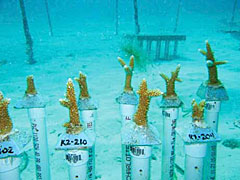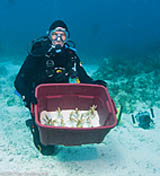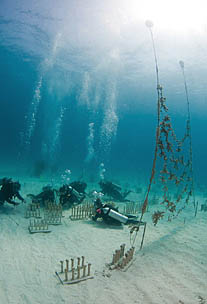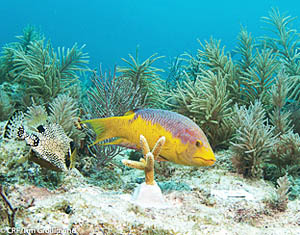What distinguishes enviropreneurs from other environmentalists? One answer is their vision; enviropreneurs see the world in a unique way. They see the prospect for cooperation where others see unsolvable conflict. They see unwritten contracts where others see unwritten regulations. They see new frontiers for free market environmentalism where others see only market failures.
Brett Howell sees the world through an enviropreneur’s eyes. As a frequent scuba diver, he often sees it through a dive mask as well, so it’s hardly surprising that he went off the proverbial deep end and took enviropreneurship underwater. Shortly after attending PERC’s Enviropreneur™ Institute, Howell left his job at a large consulting firm and joined the Georgia Aquarium as the Walker Conservation Fellow. In this role, he is exploring how contracts, cooperation, and markets can enhance marine resources.
Howell’s first objective is to develop a market for coral reef restoration off Florida’s coast. That’s no small task, as a number of physical, regulatory, and political barriers stand in the way. But spend any time with Brett Howell and it’s obvious that few things, other than needing a fresh tank, will bring him to the surface.
Diversity & Economic Value

Aside from the coral itself, the reefs also support marine species from sea urchins to sea birds. Indeed, most of Florida’s sport fish species inhabit the reefs during some portion of their lives. Additionally, many medicines as well as health and beauty products come from the marine plants, animals, and algae found on Florida’s reefs.
These environmental resources have an enormous economic impact. A joint federal and state study released in 2001 estimated Florida’s reef-related economy, including money spent by eco-tourists for diving and charter boats, generates $4 billion annually. Similar studies quantifying the reefs’ economic impact state they support an estimated 36,000 jobs in the region.
The Coral Commons
Despite their ecological and economic importance, Florida’s coral reefs are teetering on the verge of collapse. The Florida Department of Environmental Protection estimates that coral cover declined by 44 percent between 1996 and 2005. Throughout the Caribbean Basin, the loss in hard coral coverage has been even more dramatic—estimated at 80 percent since the 1970s.
The familiar rationale is that the social costs of effluent discharge and careless boat operation exceed the private costs and, until taxes or fines equilibrate those two, Florida’s coral reefs will suffer.
The cause of this decline is the focus of extensive scientific research. Several studies point to the impact of effluent discharges from municipal storm and wastewater treatment facilities along the coast. Their impact on water quality is thought to promote various types of coral disease. Other reports document the physical destruction caused by boat groundings, fishing equipment, and dive fins.
One could easily describe this situation as an instance of market failure requiring corrective action by the state or federal government, and many have. Proposals for more stringent regulation on coastal point sources and increased fines for boat collisions fill the blog rolls. The familiar rationale is that the social costs of effluent discharge and careless boat operation exceed the private costs and, until taxes or fines equilibrate those two, Florida’s coral reefs will suffer.

Buyers & Sellers
This February, Howell and PERC hosted a workshop in Key Largo exploring the question of whether contracts can help save coral reefs. The basic idea was to link the buyers and sellers of coral restoration. Not coincidentally, that is exactly who attended the workshop.
The list of potential coral restoration buyers is eclectic.
Who sells coral restoration? First and foremost, nonprofit groups like the Coral Restoration Foundation (CRF) that grow Staghorn and Elkhorn coral in ocean-based aquaculture nurseries and transplant them to wild reefs. To date, CRF has developed the largest offshore coral nursery in the United States and transplanted more than 3,000 corals at 22 different reef locations in the Upper Florida Keys. This approach to active reef management has the potential to increase the resilience and biodiversity of the reefs.
Other potential sellers of reef restoration include those whose actions currently degrade reef health, such as wastewater dischargers, commercial fishing boats, and cruise line operators. Although some might object to the concept of paying an emitter to emit less, an angler to fish less, or a cruise captain to divert off course less, such objection fails to recognize the reciprocal nature of costs and the practical effectiveness of forbearance contracts. Because coral growth is measured in inches per year, and because a single boat anchor can quickly destroy an acre, limiting the harmful activities is just as important, if not more so, than transplanting new coral.
The list of potential coral restoration buyers is eclectic. The most obvious beneficiaries of a healthy coral ecosystem are the local dive shop operators, charter boat captains, hotel owners, and restaurateurs who profit from the reef visitors. These groups might be willing to invest in reef restoration not only for the business insurance it provides but also for the reputation premium they might collect as restoration supporters.
A less obvious but potentially significant source of restoration funders are the existence consumers— those who may or may not plan to visit the reefs but who nonetheless are willing to pay some amount to know that it exists and that they contributed to restoration. Defenders of Wildlife demonstrated the effectiveness of targeting this consumer group by raising the wolf compensation trust fund with sales of posters depicting gray wolves reintroduced to Yellowstone National Park.
Let’s Make A Deal
There are currently more questions than answers about whether and how all of these potential buyers and sellers can negotiate a deal to restore Florida’s coral. The most obvious question is whether the buyers’ willingness to pay exceeds the sellers’ costs of production— whether the margins are sufficient.
Next is the important question of transaction costs. Monitoring, measuring, and enforcing performance of contractual obligations will not be cheap, be they affirmative obligations to plant coral or forbearance obligations to not destroy them. If these transaction costs overwhelm the margin, then access to the resource will remain open. On the other hand, if these costs are minimized with efficient risk allocation, creative deal structuring, and a bit of trust, then, as Monty Hall would say, “let’s make a deal.”
When it comes to minimizing transaction costs, closing commons, and eliminating externalities, it helps to have an enviropreneur like Howell in the room. His vision for a coral restoration market and his eagerness to make it a reality make him all the more ready to dive deeper.
For more information: www.walker-foundation.org





